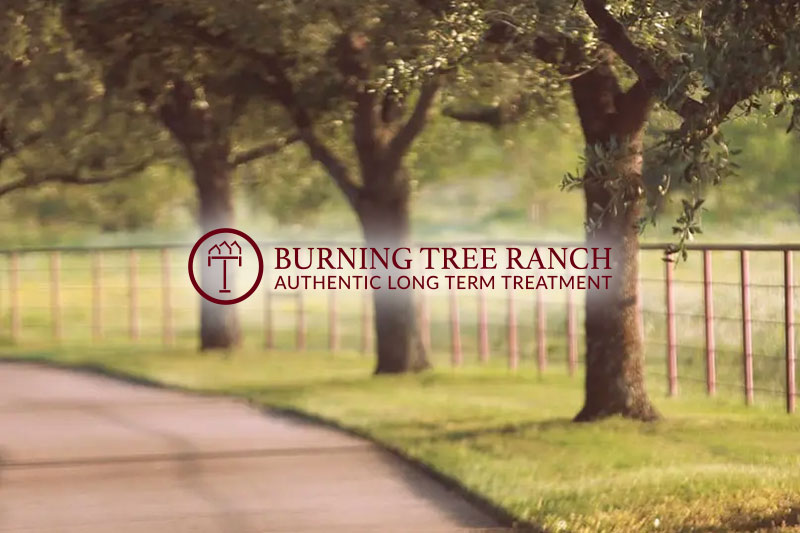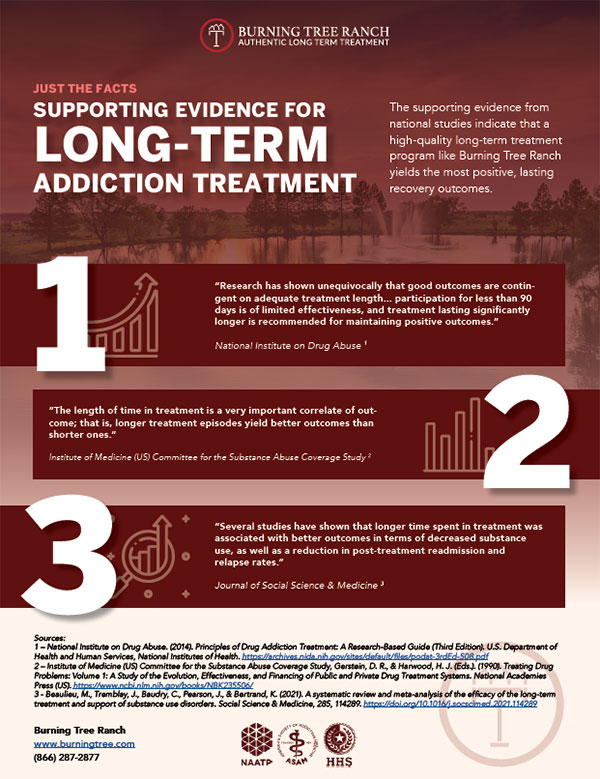The supporting evidence below, taken directly from various national studies including the National Institute of Drug Abuse, indicate that a high-quality long-term treatment program like the one at Burning Tree Ranch would likely yield the most positive, lasting recovery outcomes.
The evidence illustrates the following points:
- Addiction is a treatable disease
- Long-term treatment programs are generally more effective for lasting recovery
- There is strong support for treating addiction together with co-occuring mental health issues using a dual diagnosis approach
- Family & community involvement are an important factor in successful treatment outcomes

Supported Fact: Chronic Addiction is a Treatable Disease
“Addiction is a complex but treatable disease that affects brain function and behavior. Drugs of abuse alter the brain’s structure and function, resulting in changes that persist long after drug use has ceased. This may explain why drug abusers are at risk for relapse even after long periods of abstinence and despite the potentially devastating consequences.”
National Institute on Drug Abuse ¹
“Relapse rates for addiction resemble those of other chronic diseases such as diabetes, hypertension, and asthma.”
National Institute on Drug Abuse ¹
At Burning Tree Ranch, we’ve long recognized addiction as a complex, chronic disease that profoundly impacts brain function and behavior. Our long-term treatment model is specifically designed to address the persistent, subtle changes in our clients that can lead to relapse, even after extended periods of sobriety.
Like other chronic diseases, addiction requires ongoing management and support. This is why our program extends far beyond the typical 30, 60, or 90-day treatment, providing the time and comprehensive care necessary to rewire ingrained patterns and establish lasting recovery.
Our approach is particularly suited for those who have experienced multiple relapses, as we work to address the root causes of addiction and provide our clients with the tools to manage a life in recovery.

Supported Fact: Long-Term Treatment Programs Are More Effective Than Short-Term Programs
“The length of time in treatment is a very important correlate of outcome; that is, longer treatment episodes yield better outcomes than shorter ones.”
Institute of Medicine (US) Committee for the Substance Abuse Coverage Study ²
“Research has shown unequivocally that good outcomes are contingent on adequate treatment length. Generally, for residential or outpatient treatment, participation for less than 90 days is of limited effectiveness, and treatment lasting significantly longer is recommended for maintaining positive outcomes.”
National Institute on Drug Abuse ¹
“Several studies have shown that longer time spent in treatment was associated with better outcomes in terms of decreased substance use, as well as a reduction in post-treatment readmission and relapse rates.”
Journal of Social Science & Medicine ³
We’ve built our entire treatment philosophy around the proven effectiveness of long-term care. As the nation’s only authentic long-term treatment provider specializing in chronic relapse, we’ve become intimately acquainted with how our progress-based approach yields significant better outcomes for our clients.
Using a progress-based, multi-phased treatment plan allows us to address the deep-rooted issues that fuel addiction and chronic relapse. We focus on quality and client motivation, recognizing that retention is a key factor for lasting recovery.
Our program is long-term because it is based on progress, not time. Providing an extended continuum of care gives our clients the time they need to not only achieve sobriety but to fundamentally transform their lives and break the cycle of chronic relapse.

Supported Fact: Substance Use Often Co-Occurs with Mental Health Disorders, and a Dual Diagnosis Approach is Effective
“Many drug-addicted individuals also have other mental disorders… And when these problems co- occur, treatment should address both (or all), including the use of medications as appropriate.”
National Institute on Drug Abuse ¹
“Effective treatment attends to multiple needs of the individual, not just his or her drug abuse. To be effective, treatment must address the individual’s drug abuse and any associated medical, psychological, social, vocational, and legal problems.”
National Institute on Drug Abuse ¹
We’ve long recognized the critical importance of addressing co-occurring mental health disorders alongside substance use issues. Our dual diagnosis approach is a cornerstone of our treatment philosophy, acknowledging that effective recovery must tackle both addiction and any associated mental health conditions simultaneously.
Therefore, we work with clients and families to create a comprehensive, individualized therapeutic treatment plan that goes beyond just addressing the core issue of substance use.
Leveraging time as an asset means we have the ability to explore and practice a wide range of behavioral therapies.
By treating the whole person, not just the addiction, we provide our clients with the best possible chance for lasting recovery and a fulfilling life beyond sobriety.
Supported Fact: Family Involvement in Treatment Contributes to More Successful Outcomes
“Whether a patient stays in treatment depends on factors associated with both the individual and the program. Individual factors related to engagement and retention typically include motivation to change drug-using behavior; degree of support from family and friends; and, frequently, pressure from the criminal justice system, child protection services, employers, or family.”
National Institute on Drug Abuse ¹
The Ranch team firmly believes in incorporating the family into the recovery process for their loved one. In our experience, leaning into family involvement in the recovery program aligns with the research that shows the level of family involvement is a crucial factor in treatment engagement and retention.
We’ve designed our program to actively involve families throughout the recovery journey, recognizing that addiction is a family disease that affects more than just the individual struggling with substance use.
In fact, working as closely as we do with families is one of the aspects that makes Burning Tree Ranch such a unique, nationally renown recovery program. We’re not just treating an individual; we’re helping to heal and strengthen entire family systems.
For more information on how Burning Tree can help your loved one, please contact our compassionate admission assistance team.
Sources:
- National Institute on Drug Abuse. (2014). Principles of Drug Addiction Treatment: A Research-Based Guide (Third Edition). U.S. Department of Health and Human Services, National Institutes of Health. https://archives.nida.nih.gov/sites/default/files/podat-3rdEd-508.pdf
- Institute of Medicine (US) Committee for the Substance Abuse Coverage Study, Gerstein, D. R., & Harwood, H. J. (Eds.). (1990). Treating Drug Problems: Volume 1: A Study of the Evolution, Effectiveness, and Financing of Public and Private Drug Treatment Systems. National Academies Press (US). https://www.ncbi.nlm.nih.gov/books/NBK235506/
- Beaulieu, M., Tremblay, J., Baudry, C., Pearson, J., & Bertrand, K. (2021). A systematic review and meta-analysis of the efficacy of the long-term treatment and support of substance use disorders. Social Science & Medicine, 285, 114289. https://doi.org/10.1016/j.socscimed.2021.114289






